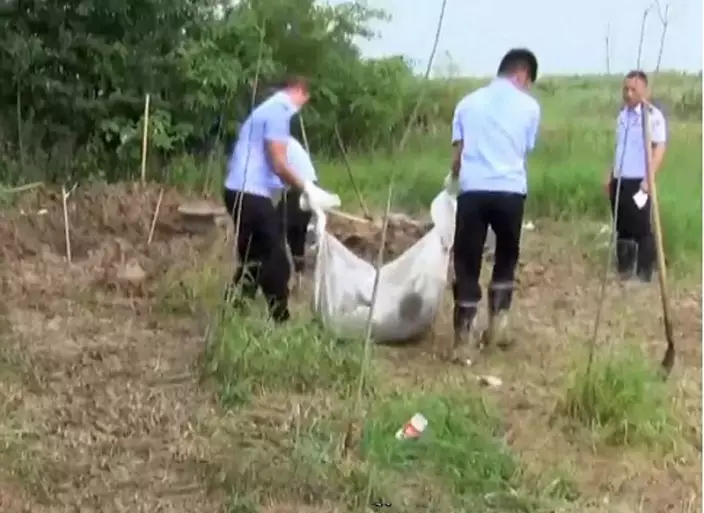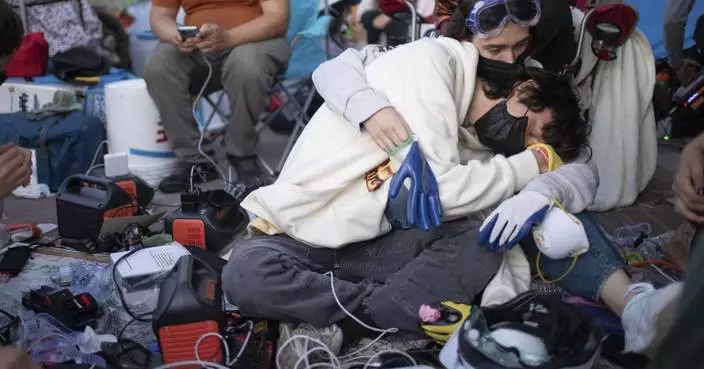Justice has long arm.
A Chinese woman surnamed Ni from Anhui Province was strangled by her husband Cheng with a towel and buried in a farmland four years ago after a dispute.
Since then, the husband had been using her wife's mobile phone to communicate with her family, pretending she was still alive. However, the victim's mother noticed that each time when she requested for a video chat, the other side immediately went offline so she had some doubts about it.

Online photo
Therefore she called the police last year. After searching for a while, they found the corpse of Ni and the husband was arrested for suspecting murdering.
In the afternoon of 10 July, under a hillside in Xiaoxihe Town, the police excavated the bones of the victim in a farmland. There are no people living around the area which is very remote.
The hillside links to a mountain grave. Four years ago, the night after the victim being killed, she was transported here by a tricycle and buried.

Online photo
Four years later, the suspect can still clearly remember the location where he buried her body. After digging deep for a metre, the police discovered pieces of bones. The DNA identification work is currently underway. According to the confession of the suspect Cheng, the person he buried is his wife Ni.
After a preliminary investigation, Ni was murdered in the afternoon of 4 August 2014. Ni’s mother clearly remembered that she called her daughter that night, but no one answered. Later, she only received text messages from "her". Now she knows that the murderer did it.

Ni's mother (Online photo)
After the murder, Cheng told Ni’s mother that Ni had gone out for work and did not know where she went. She has been calling her daughter's phone. Although the number got through, no one picked up. One time, a woman pretended to be Ni to answer the phone call but was found lying quickly.
Although no one answers the phone, her social media accounts, like QQ and WeChat was still online. Her relatives could contact her through QQ and could receive replies, while only when they asked for video chat, Ni's QQ would turned offline.
In order to meet Ni, Ni’ s mother even said she was ill. However, her daughter did not call to express her condolences. This made her suspect that her daughter might have been killed and finally decided to call the police.

Online photo
According to the preliminary investigation, because of emotional disputes, the suspect Cheng strangled Ni with a towel and other items in a store.
They had been divorced before the incident, but the two still lived together and had two children. On the day of the incident, Cheng killed Ni after their argument. Later, Cheng used a series of layouts to create the illusion that Ni went out to work. The case is now undergoing investigation.
BEIJING (AP) — A Chinese truck driver was praised in local media Saturday for parking his vehicle across a highway and preventing more cars from tumbling down a slope after a section of the road in the country’s mountainous south collapsed and killed at least 48 people.
Wang Xiangnan was driving Wednesday along the highway in Guangdong province, a vital economic hub in southern China. At around 2 a.m., Wang saw several vehicles moving in the opposite direction of the four-lane highway and a fellow driver soon informed him about the collapse, local media reported.
Reacting swiftly, Wang, a former soldier, positioned his truck to block the highway, effectively stopping dozens of vehicles from advancing into danger, Jiupai News quoted Wang as saying. Meanwhile, his wife got out of the truck to alert other drivers about the situation, it said.
“I didn’t think too much. I just wanted to stop the vehicles,” Wang told the Chinese news outlet.
Wang’s courageous actions not only garnered praise from Chinese social media users but also recognition from the China Worker Development Foundation.
The foundation announced Friday that in partnership with a car company it had awarded Wang 10,000 yuan ($1,414). A charity project linked to tech giant Alibaba Group Holding also gave an equal amount to Wang, newspaper Dahe Daily reported. Wang told the newspaper he would donate the money to the families of the collapse victims.
Local media also reported that another man had knelt down to prevent cars from proceeding on the highway.
The accident came after a month of heavy rains in Guangdong. Some of the 23 vehicles that plunged into the deep ravine burst in flames, sending up thick clouds of smoke.
About 30 people were hospitalized. On Saturday, one was discharged from the hospital, state broadcaster CCTV reported. The others were improving, but one remains in serious condition.
On Saturday, the Meizhou city government in Guangdong said in a statement that authorities would conduct citywide checks on expressways, railways and roads in mountainous areas. A team led by the provincial governor is investigating the cause of the collapse, Southcn.com reported.
The Chinese government had sent a vice premier to oversee recovery efforts and urged better safety measures following calls by President Xi Jinping and the Communist Party’s No. 2 official, Premier Li Qiang, to swiftly handle the tragedy.
The dispatch of Zhang Guoqing, who is also a member of one of the ruling Communist Party’s leading bodies, illustrates the concern over a possible public backlash over the disaster, the latest in a series of deadly infrastructure failures.

In this aerial photo released by Xinhua News Agency, rescue workers at the site of a collapsed section of a highway on the Meizhou-Dabu Expressway in Meizhou, southern China's Guangdong Province on May 2, 2024. (Wang Ruiping/Xinhua via AP)














